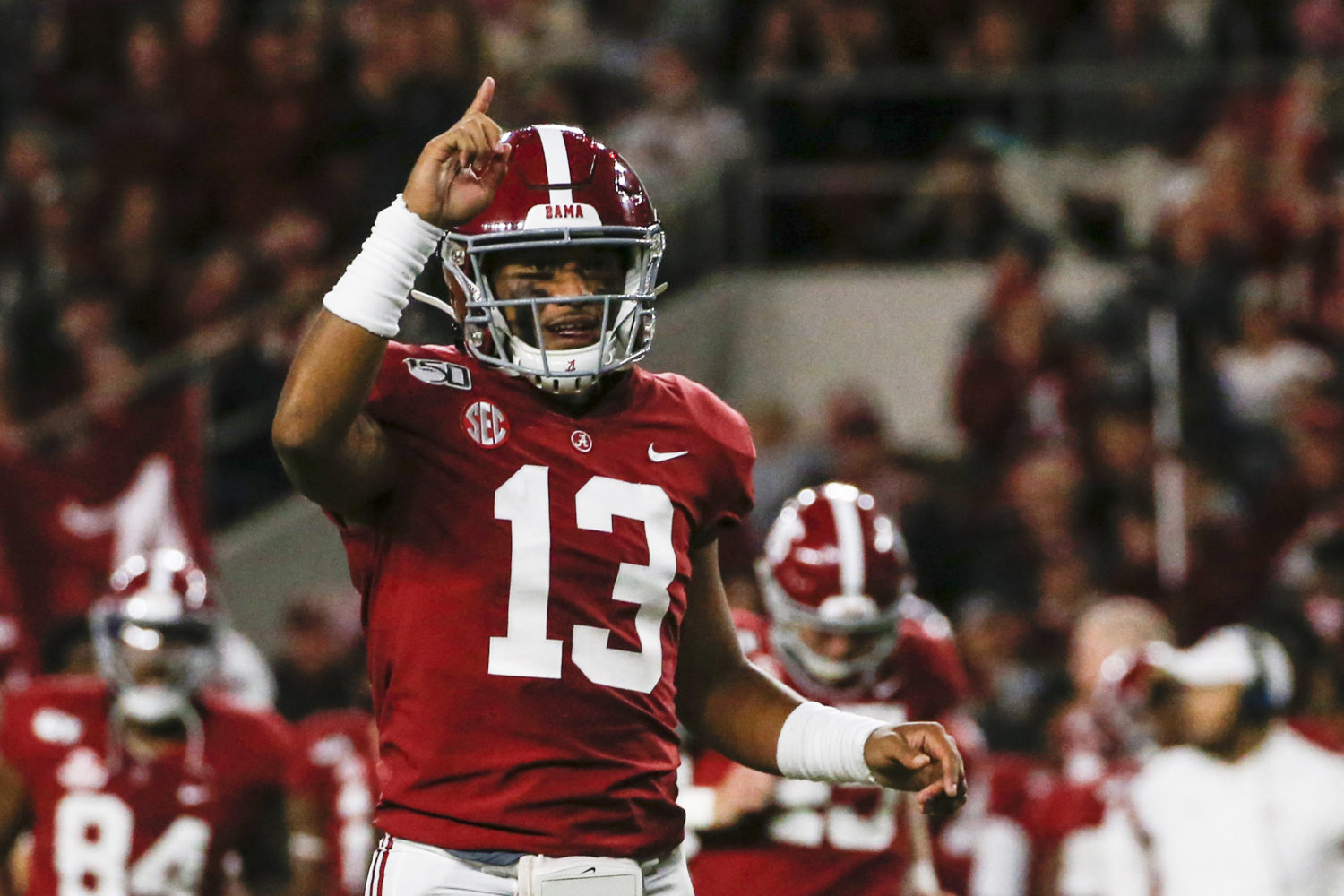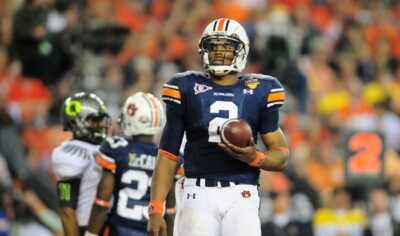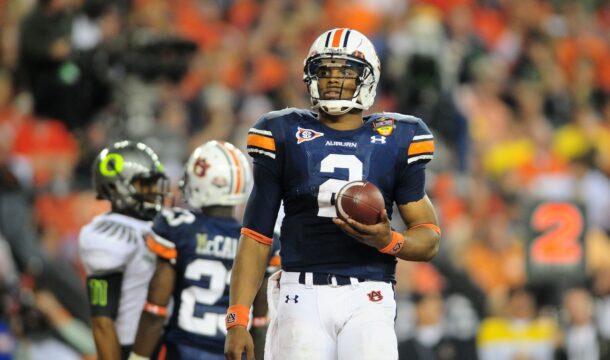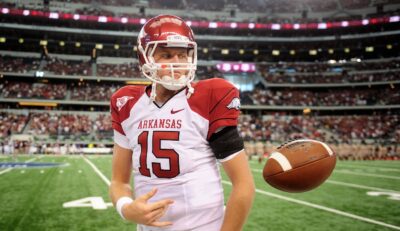
With 4 Heisman Trophy-winning quarterbacks in the past 15 seasons, it’s safe to say that the SEC has been a league with plenty of outstanding quarterback play.
Recruiting is the lifeblood of college football, and barring the occasional lightning in a bottle Joe Burrow or Cam Newton situation, finding the next great quarterback usually begins in recruiting.
For the 2020 season, the SEC adds yet another 5-star quarterback talent in Bryce Young of powerhouse Mater Dei in California, who committed to Alabama as the nation’s top-ranked QB and No. 2-ranked recruit overall in the 247 composite. Big things will be expected of young, and if history is any guide, he’ll have a great chance of panning out.
But is landing a top-ranked quarterback in the country in any given recruiting year a guarantee of success? The answer might surprise you.
We took a look at the top-ranked quarterbacks to commit to SEC schools from 2010-2019 — 1 QB per recruiting class — and ranked them.
The results include a handful of misses that demonstrate recruiting rankings certainly aren’t failproof. All things considered, however, they still tend to be really good barometers of future success, with four of the quarterbacks on the list advancing to New Year’s 6 bowl games, multiple Heisman finalists, 2 College Football Playoff quarterbacks and a national champion.
10. 2010: Phillip Sims, Alabama (No. 1 QB overall, No. 31 player overall)
How it played out: After the graduation of Greg McElroy, Sims battled it out with AJ McCarron to become the starter at Alabama. They split time over the first few games of the 2011 season, but McCarron ultimately won the gig. Sims transferred to Virginia, where he played a season to little acclaim. He ultimately ended up at Division II Winston-Salem State, where he was a serviceable college quarterback. Professional teams never forgot his talent, though, and he was given NFL tryouts and played briefly in Canada before retiring to coach high school football. In the end, Sims is a cautionary tale that recruiting rankings and 5-stars don’t always guarantee success, even at football factories like Alabama.
9. 2012: Matt Davis, Texas A&M (No. 7 QB overall, No. 124 player overall)
How it played out: A 3-star quarterback from Kerrville, Texas, named Johnny Manziel, whom Kevin Sumlin had taken a flier on the year before, ended up beating out Davis and others in an open quarterback competition during summer camp. Davis redshirted, then lost a battle with Kenny Hill to back up Manziel in 2013, and transferred quickly thereafter.
The 2012 QB class was an interesting one overall, because while it had eventual national champion/Heisman winner Jameis Winston at the top, it was otherwise largely a lost class.No. 2 prospect Gunner Kiel transferred from Notre Dame to Cincinnati, costing himself (unwittingly) a chance to compete for the job once Everett Golson got suspended. No. 3 passer Zach Kline lost the QB battle at Cal to a lightly regarded freshman named Jared Goff, No. 8 Connor Brewer never made an impact at Texas and No. 10 passer Chad Voytik lost an open competition at Pitt. In other words, the rankings on quarterbacks missed. Interestingly, No. 9 Chad Kelly ended up having the biggest impact, but only after starting his career at Clemson.
Davis was always considered a bit of a project, and recruiters thought his arm and acumen would eventually catch up with his legs. They did, eventually, and Davis was excellent as a junior after transferring to SMU, but a knee injury ended his career one game into his senior season.
8. 2013: Cooper Bateman, Alabama (No. 4 QB overall, No. 81 player overall)
How it played out: Bateman stuck around Tuscaloosa, biding his time while AJ McCarron won game after game and even after Alabama brought in Jacob Coker from FSU to be the guy in 2015. Finally, as a junior in 2016, Bateman thought his time had come. Favored to win the starting job at SEC Media Days, Bateman had a miserable fall camp and fell behind Blake Barnett, who started the season opener, and a freshman named Jalen Hurts. Hurts eventually won the job and SEC Offensive Player of the Year honors. Bateman played mop-up duty behind Hurts (Barnett left the team) and transferred to Utah. At Utah, Bateman contemplated a position change to wide receiver but ended up settling into a familiar role: backup quarterback. He finished his career with the Utes having only attempted 66 passes in 2 seasons.
Bateman is an interesting object lesson in how at football factories that recruit at an elite level, you might come in with a 5-star ranking or a high 4-star ranking, but in the end, you’re only as good as your next practice. Bateman was a talented kid, but he never found a roster where is was the best quarterback.
7. 2015: Blake Barnett, Alabama (No. 2 QB overall, No. 22 player overall)
How it played out: Initially, it looked like it would play out well. Barnett beat out Bateman (above) and young Jalen Hurts for the starting job in 2016, and he was Nick Saban’s choice to start the season opener against USC, which the Tide won 52-6.
Here’s the thing about that game, though: Hurts ended up being the guy who moved the offense, and Bama never looked back.
Barnett became the backup and rather than playing mop-up duty, elected to quit the team. He transferred to Arizona State, where he also lost a quarterback competition, and rather than stick around Tempe, elected to transfer again, this time to South Florida. He was decent with the Bulls as a junior, throwing for 2,705 yards and 12 touchdowns, but an injury cut short his senior season in 2019 and it’s safe to say he never made the impact expected of a 5-star quarterback recruit.
6. 2014: Kyle Allen, Texas A&M (No. 1 QB overall, No. 8 player overall)
How it played out: Bizarrely. Allen played immediately and was not bad as a freshman, filling the impossible shoes of Johnny Manziel by throwing for 1,692 yards as a freshman. He built on that campaign as a sophomore, throwing for 2,210 yards and 17 TD but then announced, in a surprise move, that he would transfer in December of 2015. Few concrete details were given as to why he was transferring at the time, and the story become even stranger when Kyler Murray left shortly thereafter.
Allen landed on his feet at Houston, but didn’t play a ton for the Cougars and then, with the job his to lose as a senior, elected to bolt for the NFL. Finally, he stuck, and he had a quality season in relief of the injured Cam Newton in 2019.
Still, this is a strange tale that illustrates how hard it is even for big 5-star talents to replace program legends, especially at the quarterback position.
The No. 2 QB in that class? Deshaun Watson, out of Georgia.
5. 2019: Bo Nix, Auburn (No. 2 QB, No. 33 player overall)
How it played out: This one is still to be determined, but there was plenty to like from the kid with royal Auburn bloodlines as a freshman. Nix thrilled in Auburn’s comeback win over Oregon to begin the regular season and closed it with an outstanding performance and victory over Alabama, something that you might have heard means a little bit more in that fine state.
In between, there were some great days (340 yards passing vs. Ole Miss, nearly 400 yards of total offense vs. Miss State) and some tough days (a brutal three-interception afternoon in The Swamp, a 42% completion percentage against LSU). But Nix gained valuable experience and returns most his playmakers in 2020– cause for plenty of optimism on the Plains.
Other SEC starters from that class included No. 4 Ryan Hilinski, No. 13 Garrett Shrader, No. 18 John Rhys Plumlee, No. 25 K.J. Jefferson and No. 36 Brian Maurer.
4. 2011: Jeff Driskel, Florida (No. 1 QB overall, No. 17 player overall)
How it played out: Driskel is a curious case and perhaps the toughest player on the list to rank. As a freshman starter, he helped guide Florida to an 11-1 season and a Sugar Bowl berth. But playing under multiple coordinators and in a run-first system that didn’t suit his dual-threat abilities, Driskel never truly flourished under Will Muschamp.
An injury robbed him of his sophomore season, and by the time he was a junior, his confidence was shot and he was splitting time with Treon Harris, who ultimately “won” the job late in the season.
Driskel’s fortunes at Florida largely tracked Will Muschamp’s, and when Boom was fired, Driskel transferred. Driskel surfaced at Louisiana Tech and had a revival senior season under Skip Holtz, throwing for over 4,000 yards and 27 TD and leading Tech to a 9-win season and New Orleans Bowl victory.
Driskel impressed enough as a senior to be drafted in the 6th round by the Bengals, and he’s played as a spot starter and capable No. 2 QB in the NFL since, most recently with the Detroit Lions.
In the end, Driskel never lived up to his No. 1 QB billing, but it’s fair to wonder what a quality coordinator and the right offense would have done for a player with his dual-threat skillset and talent.
This class was one the recruiting analysts would like to have back.
Johnny Manziel was the No. 22-ranked QB in this class. Cardale Jones, who led Ohio State to the 2014 national championship, was No. 24 and Marcus Mariota was No. 31.
3. 2016: Shea Patterson, Ole Miss (No. 1 QB overall, No. 4 player overall)
How it played out: Patterson was never great but always a good quarterback, whether you evaluate his time at Ole Miss or Michigan. Patterson replaced the injured Chad Kelly as a freshman then won the starting job in Oxford as a sophomore and was terrific at times, throwing for 2,259 yards and 17 touchdowns in just 7 games. But Hugh Freeze was fired in a scandal, Ole Miss was rocked by a bowl ban and Patterson jumped off the sinking ship, landing at Michigan.
With the Wolverines, Patterson won plenty of football games and led the Fighting Khakis to a New Year’s 6 Bowl as a junior and a 9-4 Citrus Bowl season as a senior. Did he ever produce No. 1 QB overall numbers? No. But he was a good college quarterback whose arm strength and smarts should get him a look at the next level.
Jacob Eason and K.J. Costello (now at Mississippi State) were the No. 2 and 3 QBs in that class, respectively. Feleipe Franks was No. 5 and Jarrett Guarantano No. 7. Jalen Hurts, who was No. 13, had the best college career.
2. 2018: Justin Fields, Georgia (No. 2 QB overall, No. 2 player overall)
How it played out: Fields picked Georgia over Florida and Ohio State but couldn’t wrestle the job from returning starter Jake Fromm, who had led Georgia to the national title game as a freshman.
Fields ultimately was unhappy with the way he was used by Georgia’s staff, and, citing off-field issues, elected to transfer. He was granted a waiver by the NCAA to play immediately at Ohio State, where he led the Buckeyes to a B1G championship and College Football Playoff as a sophomore. How much he improves as a junior might tell the tale of whether he delivers on his signing day promise to win a national championship — even if that doesn’t happen in Athens for the first time since 1980.
The No. 1 QB in the 2018 class? Clemson’s Trevor Lawrence, also from Georgia.
1. 2017: Tua Tagovailoa, Alabama (No. 3 QB overall, No. 32 player overall)
How it played out: Along with Jalen Hurts, Tagovailoa’s incredible ability changed the way Alabama played offense, turning the Tide from a power running football team that won championships with defense to a program that could beat you with swashbuckling, high-flying stretch-the-field offense too.
After backing up Hurts in 2017, Tagovailoa came off the bench to lead Alabama to a comeback national championship victory over Georgia as a freshman with a walkoff TD pass on 2nd-and-26.
Pretty impressive stuff — but that was just the beginning. He threw for nearly 4,000 yards as a sophomore and would have done it again as a junior but for the terrible hip injury that ended his collegiate career too soon. Tagovailoa departs the Capstone an Alabama, and probably one of the greatest quarterbacks in SEC history.
That class also features a few familiar names. Jake Fromm was the No. 4 QB, followed by No. 7 Kellen Mond, No. 10 Myles Brennan, No. 12 Keytaon Thompson and No. 29 Mac Jones, who replaced Tagovailoa this past season and is the heavy favorite to win the job in 2020.
Neil Blackmon covers Florida football and the SEC for SaturdayDownSouth.com. An attorney, he is also a member of the Football and Basketball Writers Associations of America. He also coaches basketball.







